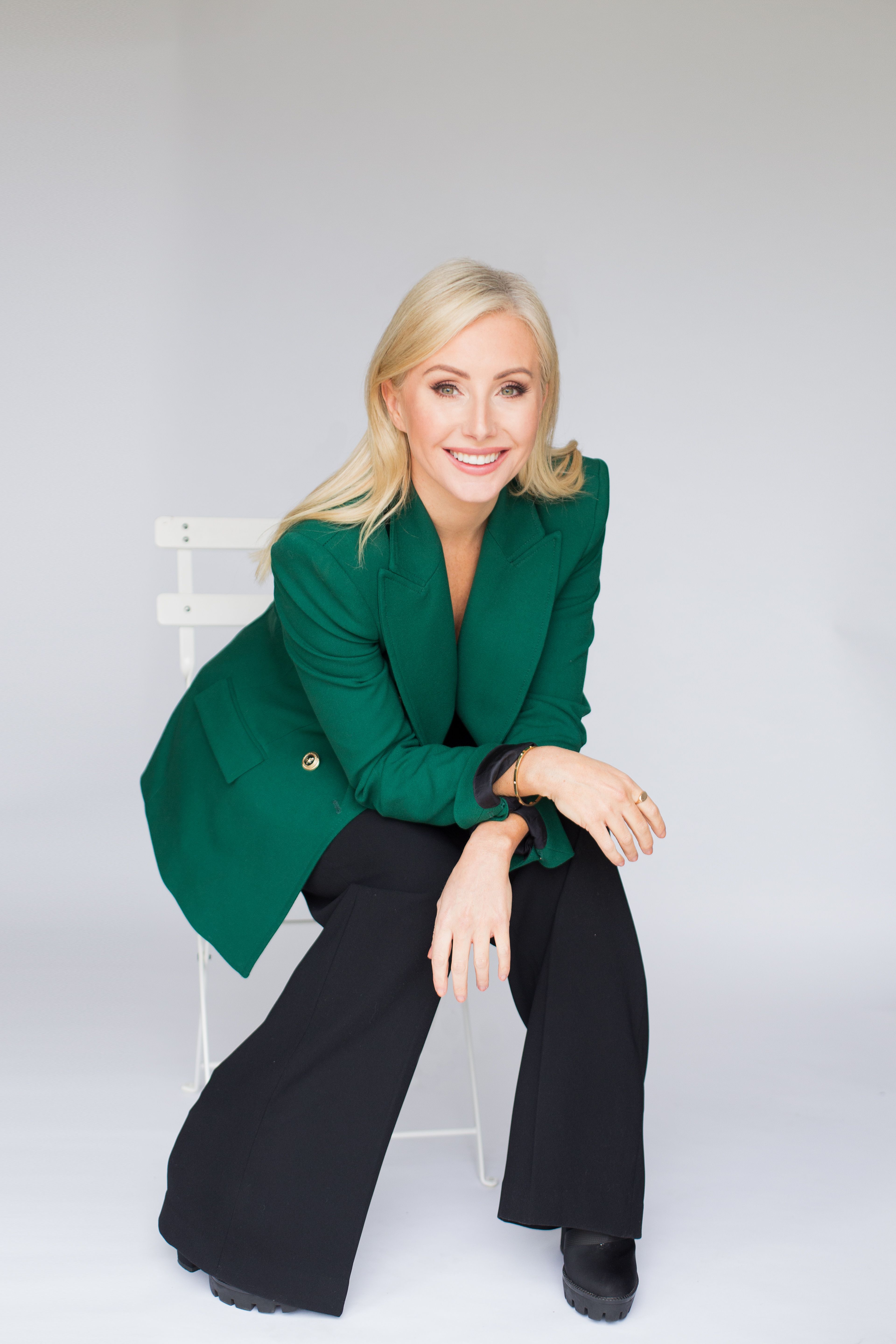In the wake of Scandal’s series finale on April 19, I’ve been reflecting on what the show meant to me as a young woman. During it’s first few seasons, I wanted to be Olivia Pope when I grew up, at least until the show got a little scary and I realised her problems were not at all enviable. I was already in my 20’s, but Olivia’s confidence, sharp eye for detail and easy knack for spin inspired the PR girl inside me.
Coming as a surprise to many, Scandal set fire to the political dramas that had come before it. While its narratives were outrageous, and characters were undeniably nefarious, it always had something important to say.
The show debuted in 2012, in a relatively positive time for American politics, at least in comparison to the media circus of the country’s current administration. A careful concoction of the hope of Obama era, and the struggles of America past, it threw a microscope to the political climate. What it did was examine the surge of American power and what it takes to clean up the mess. What it takes, it turns out, is Olivia Pope.
As the first black female lead in 40 years on a network drama, Olivia Pope was not only a black woman with meaty storylines, undeniable charm and a killer wardrobe, she was arguably one of the most polarising antiheroes of television. I haven’t felt so conflicted about a character since Tony Soprano, which can only be a good sign. Olivia’s (sometimes evil) actions, toxic relationships and ruthless ambition have provided many a talking point over the years. If you know what she did with that chair, then you know what I’m talking about.
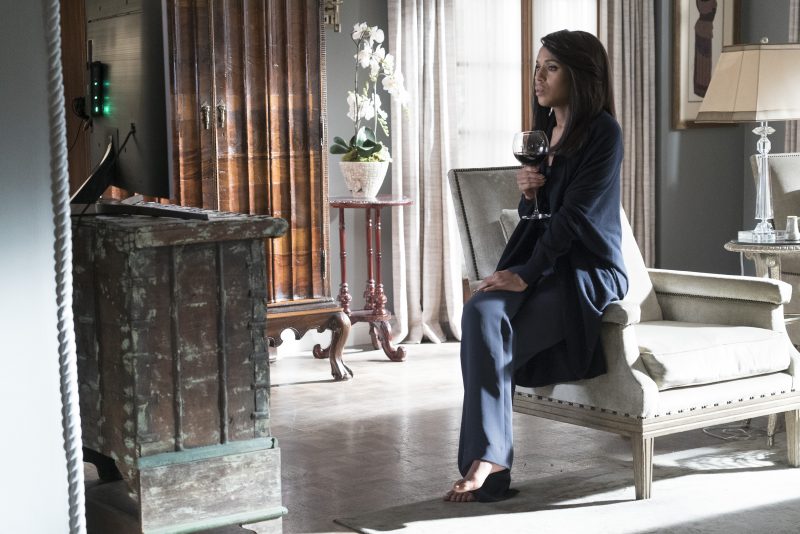
Its effects on television are also well documented. Scandal, which only enjoyed a 7 episode first season, was unlikely to achieve multiple returns to the air, actually ended up making money.
Delivering twisty political drama, and weighted with darkness that few television series have managed to pull off, it enthralled its audience. A story laced with skulduggery, secrets and sex, few shows have been as outrageous, unbelievable or gossip worthy than this particular Shonda Rhimes drama.
Audiences passionately engaged with the cast and producers during the live tweeting of episodes, and it quickly became a cult hit. Its early successes and highly engaged audience of women of colour, paved the way for complex black female protagonists to make their mark on network television. When Olivia Pope fired up young, female driven audiences, the big networks noticed.
While television has miles to go before it becomes reflective of how the world really looks, it’s taken some leaps since the show’s early days. For many African American women, seeing themselves represented on television began with Olivia Pope.
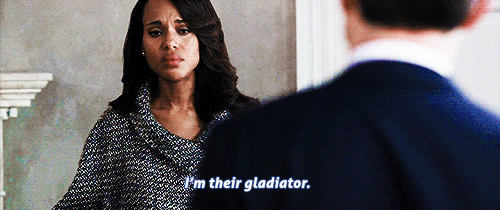
Kerry Washington effortlessly delivered the best and worst in Olivia Pope, who sauntered her way around Washington DC in the best collection of coats I’ve ever seen. Honestly, I’d line up at a museum just to see those damn coats on a rack.
The power of Scandal lay in its ability to have its audience empathise with its characters, even after 124 episodes of torture, murder and treachery. Few characters were exempt from evil, and those who were, were met with grisly endings. Nice guys didn’t finish last on Scandal, they didn’t even make the finish line. Nice guys, at least in this Shondaland town, die.
Just a few months ago, I was engaged in post-Scandal dissection with my colleague and clearly remember saying “Honestly, I hate Olivia right now”, to which she nodded and with a grimace, responded, “She has gone rogue.”
During its last season, Olivia was ensnared by power. Power controlled Olivia, and Olivia controlled Washington. It was tough to watch because while Olivia had always been ruthless, she had always been fair. While she became more morally compromised, she was still one of the good guys. She became more unlikeable than we were used to, and we watched her hit rock bottom. Most of us said she deserved to be there.
Olivia’s fall from whatever grace she had left was inevitable. She needed to become a true antihero. People do bad things, but they’re not always beyond repair. For a time, we needed to hate Olivia, only to be reminded that redemption exists, and bad actions don’t always equate to bad people.
Women need to be unlikeable on television, and writers can’t fear the outrage of audiences. Women need to be real three-dimensional people, not prizes at the top of a pedestal. Olivia Pope and her team of gladiators were warriors, but their arena meant more blood shed than any person could possibly live with. Their flaws, complexities and histories made them loveable, even when they weren’t. A viewer’s relationship with Scandal’s characters was disorientating and confusing, and often left us wrestling with our own morals. It pushed necessary buttons to elicit the most valued, human quality of empathy.
Olivia spent the last seven years as a flawed, driven woman, fixing every problem that comes out of the Hill’s can of worms. She rigged elections, assassinated world leaders, and for a brief time, became the monster under the White House bed when she slipped into the role of Command of B613. She fixed more scandals than I can recall, but she also fixed part of my own relationship with myself.
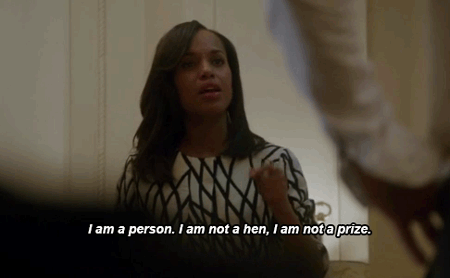
Olivia Pope made me realise that it’s okay to do all that is necessary to succeed, and that even powerful women make mistakes. Olivia demonstrated that even she was not untouchable and that a woman can wield her own power, even after getting lost in it. Olivia was maddening, complex, but mostly she was human. She demanded more from those around her and wasn’t afraid to tell the people she loved (or hated) to do better, to be better.
Scandal was fearless in its mission to spotlight issues such as sexism, abortion and America’s complicated history with racism, with Olivia’s father regularly scolding her for acting like a ‘slave’, and forcefully reminding her “You have to be twice as good as them to get half as what they have.”
Rowan, while ruthless and cold blooded, provided the show with the gritty counterarguments it needed to hit a nerve. The finale’s final and timely critique of white power came from the show’s most chilling villain, one that I rooted for.
Rowan tells a closed committee of white men in suits, “Because of you… masters of universe, white men whose complacency left this country in a state of neglect”, before dramatically knocking the wind out of the audience with his final hit to the gut, “I want to see with my own eyes the face of every white, complacent, privileged man who believes that he is in a position of power when he hears the news that a black man has been running this country for the last 30 years. That he only wields his power because my black power allows him to.”
Its scrutiny of American issues was undeniably influential, and crucial to those of us who have never experienced racial bias. Always stunning, often unnerving and sometimes ugly, Scandal dished out the reflection of modern attitudes that have puppeted, and equally blinded, many.
Olivia Pope made female success accessible, and it made it acceptable for them to make the most damaging of mistakes. A showcase of corrosive relationships, affairs and dark deeds that may only live in the vacuum of Scandal’s DC, but it gave young women plenty to discuss.
At its core, Scandal’s big bad was always power. This glossy, topsy turvy political spectacle was home to an investigation on the vicious grip of American power, control, and a government that protects itself above all else. Scandal’s political scrutiny would follow through until its swan song, when Olivia freed herself from the power that took her down.
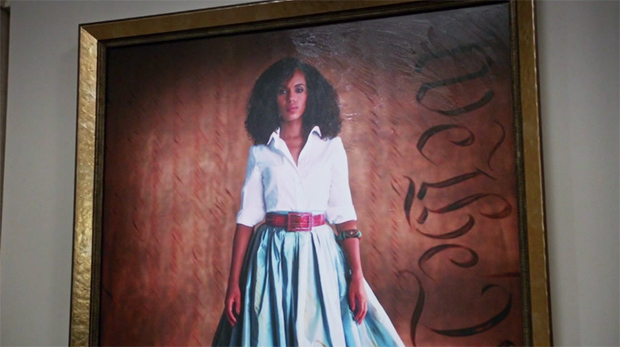
In the show’s closing moments, Olivia’s portrait in the National Portrait Gallery serves as a reminder of not only black female power, but of what should always come first, “We the people.”
For a lot of young women who have loved the show, we fondly remember some of Olivia’s finest lines of empowerment. We know that when men demand something from us and when their entitlement bares its teeth, that we can demand, “If you want me, earn me.”
Raise your next glass of finest red to Olivia Pope, a free black woman who made young women want more from men, more from the systems that fail great countries, and better coats.



